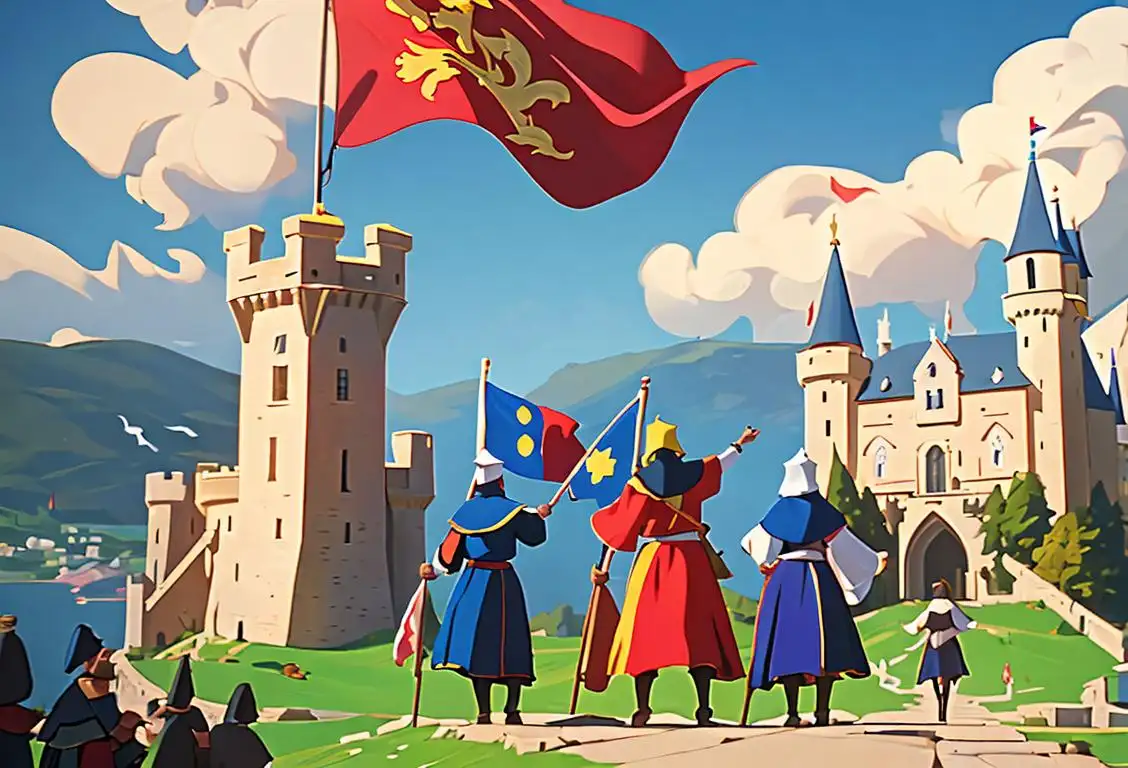National Herald Day

Ah, National Herald Day! A day to celebrate all things heraldry and the noble art of waving flags and shouting messages from the rooftops. It's a day that gives you permission to adopt an air of genteel superiority and pretend that you're a knight of old, fighting valiantly for honor and glory. So gather your loved ones, put on your medieval garb (or just a really fancy hat), and let's dive into the rich history of National Herald Day!
When is Herald Day?
It's national herald day on the 12th June.
The Origins of National Herald Day
Believe it or not, National Herald Day has its roots in a time long ago when communication wasn't quite as simple as it is today. Back in the day, towns and villages relied on heralds to spread important messages far and wide. These heralds, often mounted on horseback and dressed in garish colors, were like the original news anchors - except with more feathers and a distinct lack of teleprompters.
On National Herald Day, we pay tribute to these brave messengers of yore and their contributions to society. To honor them, people from all walks of life gather to reenact important historical events, shouting announcements and waving colorful flags with fervor.
How to Celebrate
So how can you celebrate National Herald Day? Well, you don't have to be a professional herald to get in on the fun. Here are a few ideas to get you started:
- Host a herald-themed party: Decorate your home with flags, dress up in your finest medieval attire, and announce the arrival of each guest in grand style.
- Create your own family crest: Design a unique family crest that represents your loved ones. It's the perfect opportunity to showcase your creativity and personalize your noble lineage.
- Learn about heraldry: Dive into the fascinating world of heraldry and discover the hidden meanings behind symbols, colors, and mottoes.
Did You Know?
Did you know that the term 'herald' comes from the Anglo-Norman word 'heraut', which means 'messenger'? It makes sense when you think about it - heralds were the original messengers of news and information!
History behind the term 'Herald'
14th century
The Origin
The term 'herald' originates from the Old French word 'heralt', which referred to an official messenger or envoy who served as a royal court official. Heralds were responsible for delivering messages, proclamations, and announcements on behalf of the ruling monarch or noble families. At this time, heralds also acted as advisors on matters such as armorial bearings and genealogy.
15th century
The Heraldic Role
During the 15th century, heralds began to establish themselves as experts in heraldry, which is the design, study, and regulation of coats of arms. They played a crucial role in the interpretation and creation of coats of arms, acting as artists and record keepers for noble and knightly families. Heralds also organized tournaments, managed ceremonial events, and ensured proper conduct on the battlefield.
16th century
Heraldic Colleges
In the 16th century, heraldic colleges and authorities were established to regulate and maintain heraldry. The most prominent example is the College of Arms in London, which was founded in 1484. These institutions provided official recognition and documentation of coats of arms, granting them legal protection and ensuring their accurate usage. Heralds became part of an organized profession, serving both the monarchy and the general public.
18th-19th centuries
Decline in Official Roles
With the advent of more efficient means of communication, such as newspapers and postal systems, the official role of heralds began to decline in the 18th and 19th centuries. However, their expertise in heraldry remained relevant, and heraldic authorities continued to oversee the granting and regulation of coats of arms.
20th century
Heralds Today
In the modern era, heralds have transitioned into more ceremonial and symbolic roles. They are often seen at state occasions, royal events, and important ceremonies, dressed in distinctive and elaborate heraldic attire. Their primary function now is to preserve and promote the traditions of heraldry, acting as guardians of historical identity and symbols of lineage and prestige.
Did you know?
Did you know that the term 'herald' comes from the Anglo-Norman word 'heraut', which means 'messenger'? It makes sense when you think about it - heralds were the original messengers of news and information!Tagged
romance funFirst identified
22nd April 2015Most mentioned on
12th June 2017Total mentions
271Other days
Tv On The Same Day
Do Something Nice Day
Honesty Day
Iloveyou Day
Kiss A Ginger Day
Happiness Day
Dance Day
Compliment Day
Single Ppl Day
Suicide Prevention Month Day









